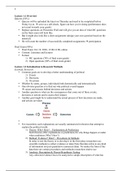College aantekeningen
College aantekeningen Research Methods In Political Science (6442HRM)
Dit zijn mijn volledige aantekeningen van alle colleges van Research Methods in Political Science dat wordt gegeven in het tweede jaar van IRO. Alles wat er staat over het tentamen gaat over het eerste tentamen in oktober 2020.
[Meer zien]




